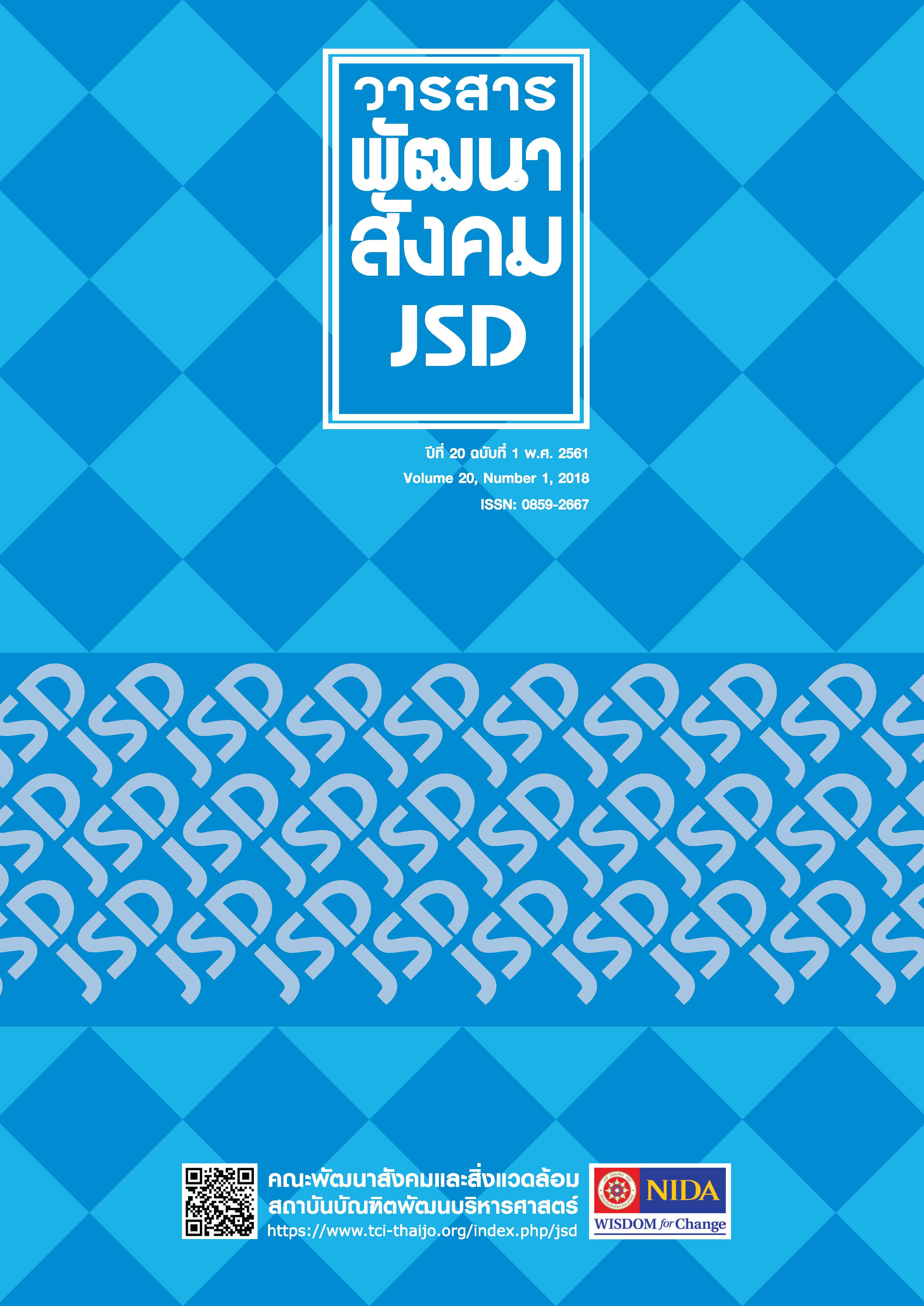Building a Social Network Model on the Facebook for Women Love Problem Management
Main Article Content
Abstract
This research has three objectives:1) to investigate social contexts of the Facebook users and personal attributes of those entering the designated Facebook network for the management of women romantic love problems; 2) to examine patterns of members’ interactions on the Facebook as related to the management of women romantic love problems; and 3) to build a social network model for the management of women romantic love problems on the Facebook. The research was operated following the qualitative research approach in which two methods were adopted: participatory action research (PAR) and case study. Data analysis was done by means of understanding meaning, categorization, data synthesis, and interpretation.
Findings from the target group of 61 observations revealed that the Facebook community can illustrate the relationship among its members in a form of social network which can be explained based on the “Addressee Honorific” norms. The community characterizes the combination of the primary and secondary community types according to the Gemeinshaft and Gesellshaft concepts. From 10 case studies, their interactions related to the management of love problems can be divided into four patterns: 1)parent; 2) sibling; 3) relative; and 4) friend. Additionally, two levels of love problem management were found: personal level and group level. Data synthesis for building a model of social network for the management of love problems in women revealed that there were two related processes i.e. building process and development process, and three cycles including: 1) conceptual cycle, 2) model building cycle, and 3) model development cycle which all are interrelated. This model can be applied as a basic concept in creating online spaces to function as a virtual community for the management of love related problems through learning processes mutually undertaken by network members. Additionally, it enables to improve the relationship among network members which is supportive for those facing love related problems.
Article Details
References
2. Barker, J. (2002). Neighbors, Friends, and Other Nonkin Caregivers of Community-Living Dependent Elders. The Journals of Gerontology Series B: Psychological Sciences And Social Sciences, 57(3), S158-S167. doi.org/10.1093/geronb/57.3. s158
3. Bowling, A., Farquhar, M., & Browne, P. (1991). Life satisfaction and associations with social network and support variables in three samples of elderly people. Int. J. Geriat. Psychiatry, 6(8), 549-566. doi.org/10.1002/gps.930060803
4. Howie, L., Troutman-Jordan, M., & Newman, A. (2014). Social Support and Successful Aging in Assisted Living Residents.Educational Gerontology, 40(1), 61-70. doi.org/10.1080/03601277.2013.768085
5. Institute for Population and Social Research, Mahidol University. (2012). ThaiHealth 2012Food Security:TheIllusionof MoneyVSTheRealityofFood. [in Thai]. (Researchreport).Retrieved from http://www.hiso.or.th/hiso/picture/reportHealth/ report/ThaiHealth2012.pdf
6. Jitramontree,N., Thongchareon,V., Thayansin,S. (2011). Good Model of Elderly Care in Urban Community. [in Thai]. Journal of Nursing Science. 29(2), 67-74.
7. Kotter, John P. (1996). Leading change. United States: Harvard Business School Press.
8. Kuhirunyaratn, Piyathida and others. (2007). Social Support Among Elderly in Khon Kean Province, Thailand, The Southeast. [in Thai]. Asian Journal of Tropical Medicine and Public Health, 38 (5), 936-946.
9. Kumsuchat, S. (2003). The Development of Alliances for Health Promotion Among the Older Persons in an Urban Community in Bangkok. [in Thai]. Dissertation of Doctoral of Public Health Nursing. Mahidol University
10. Li, H., Ji, Y., & Chen, T. (2014). The Roles of Different Sources of Social Support on Emotional Well-Being among Chinese Elderly. Plos ONE, 9(3), e90051.
11. Malathum,P., Kongiem,J., Intarasobat,P. (2009). Relationships of Family Support and Friend Support to Life Satisfaction of Older Adults in Rural Areas. [in Thai]. Rama Nurse Journal. 15 (3), 431-447.
12. Moopayak,k., Rattanathanya,D., Foungfoo,S. (2010). Community Health Development: Lesson Learned Working in the Area of Health Promotion for Older Adults by the Community. [in Thai]. Journal of Nursing Science. 28(3), 66-77.
13. National Statistical Office. (2014). The 2014 Survey of the Older Persons in Thailand. [in Thai]. (Researchreport). Retrieved from http://service.nso.go.th/nso/nsopublish/themes/files/elderlyworkFullReport57-1.pdf
14. Phillips, D., Siu, O., Yeh, A., & Cheng, K. (2008). Informal Social Support and Older Persons Psychological Well-Being in Hong Kong.Journal Of Cross-Cultural Gerontology, 23(1), 39-55. doi.org/10.1007/s10823-007-9056-0
15. Raeside, R., and others. (2010). Social Support Mechanisms of the Elderly: Insights from the British Household Panel Survey. The International Journal of Interdisciplinary Social Sciences. 5 (8) 163-178.
16. Requena, F. (2013). Family and friendship support networks among retirees. International Journal Of Sociology And Social Policy, 33(3/4), 167-185. doi.org/10.1108/01443331311308221
17. Siviroj,P. (2000). Development of organizational management model of elderly club for selfhealth care. Bangkok: Mahidol University.
18. Starkey, P. (1997). Networking for Development. England: International Forum for Rural Transport and Development.
19. Supasirivut,T. (2005). Psychological, Environmental, and Bio-social Factors Related to Caring Behavior for Elderly Parents. [in Thai]. (Master’s thesis) Retrieved from http://library.cmu.ac.th/moralcorner/sites/default/files/pictures/re-2013-5.pdf
20. Tang, Y. (2008). Social Support of Elderly Caregivers. IJBM, 3(8).http://dx.doi.org/10.5539/ijbm.v3n8p81
21. Yuan, R. and Ngai, S. (2012). Social Exclusion and Neighborhood Support: A Case Study of Empty-Nest Elderly in Urban Shanghai. Journal of Gerontological Social Work, 55(7), 587-608.


